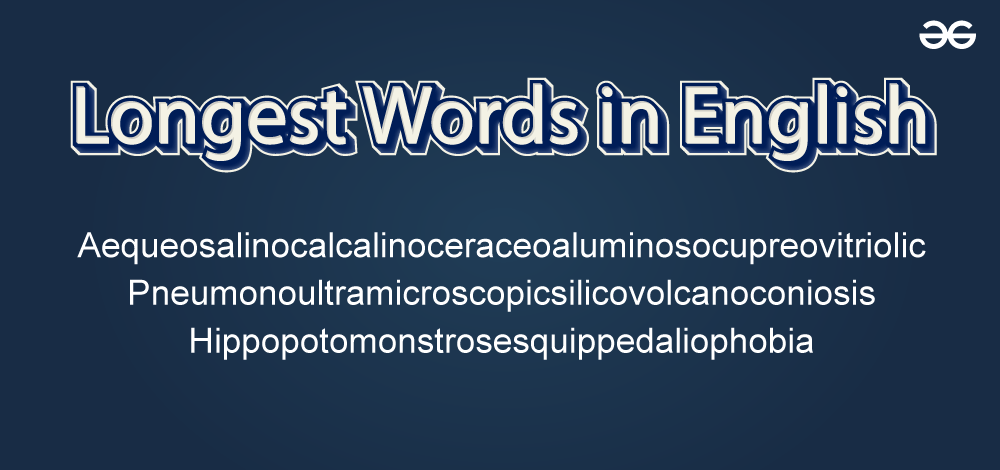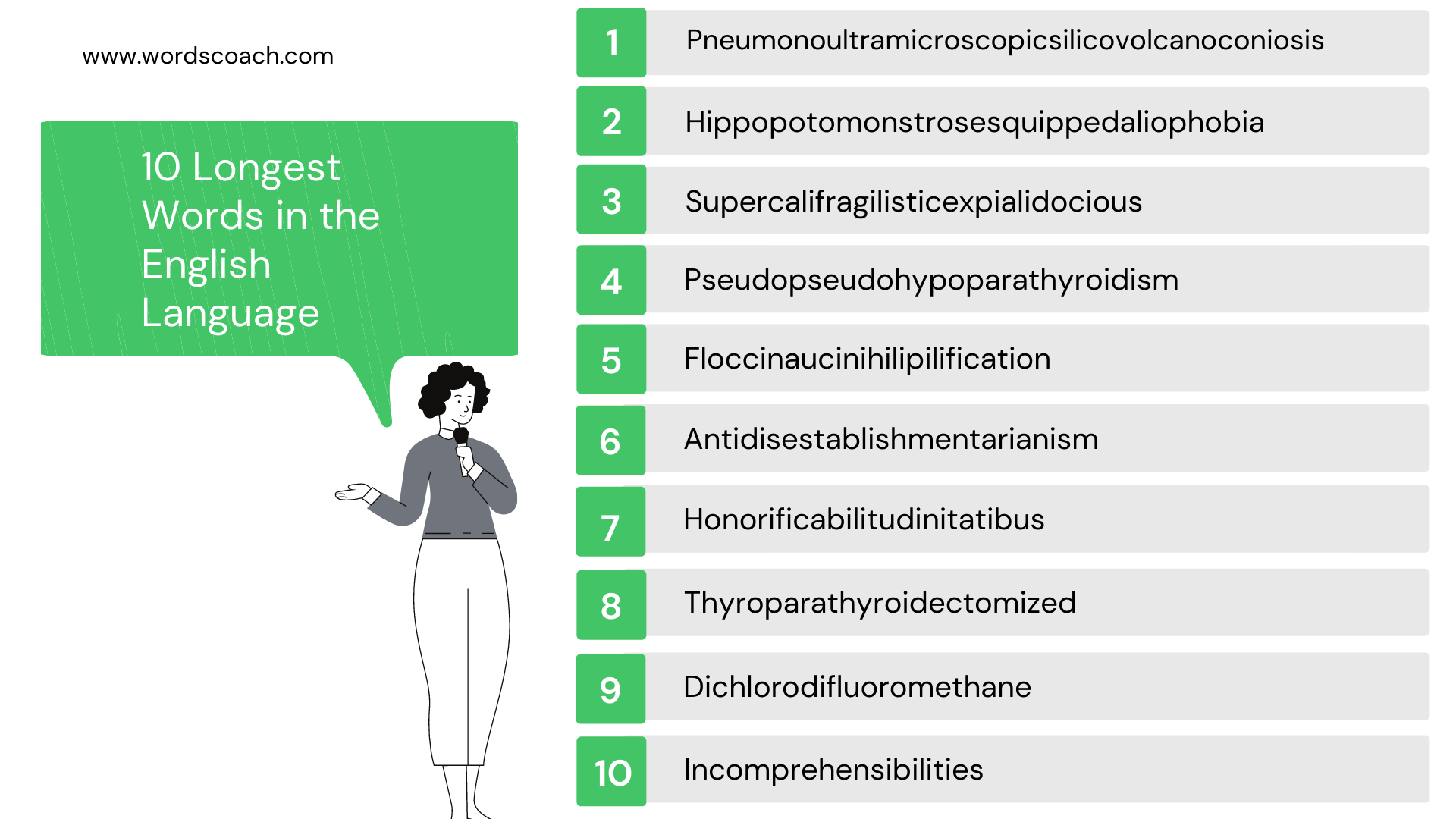Unraveling The Longest English Word: A Deep Dive
Have you ever found yourself marveling at the sheer length of some English words, wondering just how long a word can get? The quest for the **longest word in English** is a fascinating journey that takes us through scientific nomenclature, historical quirks, and even deliberate linguistic inventions. It's a topic that not only challenges our pronunciation skills but also offers a unique glimpse into the dynamic nature of language itself. From terms you might vaguely remember from school to chemical names that span pages, the world of sesquipedalianisms (a word meaning “a long word or phrase”) is truly expansive.
This article will explore some of the most formidable words in the English language, distinguishing between those found in major dictionaries, technical terms, and even those disputed or contrived. We'll delve into their origins, meanings, and even offer tips on how to break them down so you can confidently pronounce these linguistic behemoths. Prepare to discover how many letters the longest English word truly has and uncover terms that could score you major points on your next game – if you can remember how to spell them, that is!
Table of Contents
- The Quest for Length: Defining What Counts
- The Dictionary Champion: Pneumonoultramicroscopicsilicovolcanoconiosis
- The Undisputed Technical Titan: Titin's Chemical Name
- Other Notable Long English Words
- The Longest Words in Major Dictionaries
- Words with Unique Vowel Patterns
- The Art of Breaking Down Long Words
- Why Do We Care About the Longest Word in English?
The Quest for Length: Defining What Counts
When we talk about the **longest word in English**, the answer isn't always straightforward. The definition of "longest" can vary wildly depending on what criteria we apply. Are we looking for words that appear in major dictionaries? Or do we include highly specialized technical terms, coinages, or even fictional dishes? This distinction is crucial because it leads us to vastly different answers. For instance, some words are meticulously crafted for scientific precision, while others might be playful inventions or historical curiosities.
Major dictionaries like the Oxford English Dictionary (OED) serve as gatekeepers, including words that have gained a certain level of common usage or historical significance. However, the world of scientific nomenclature operates under different rules, often creating words that are, in essence, descriptive formulas rather than traditional lexical entries. Understanding these different definitions, lengths, and origins is key to appreciating the full scope of what constitutes a "long word" in English. We'll find out which words are in major dictionaries and which are disputed or contrived, setting the stage for our countdown to the longest words in English.
The Dictionary Champion: Pneumonoultramicroscopicsilicovolcanoconiosis
For many, the answer to "What's the **longest word in English**?" immediately brings to mind one specific term: "Pneumonoultramicroscopicsilicovolcanoconiosis." This word is widely recognized as the longest word entered in most trusted English dictionaries, including the Oxford English Dictionary. With a staggering 45 letters, it's a true tongue-twister that has captivated word enthusiasts for decades.
Deciphering the Meaning and Origin
"Pneumonoultramicroscopicsilicovolcanoconiosis" is not just a random string of letters; it has a very specific medical definition. It refers to a lung disease caused by inhaling very fine ash and sand dust, specifically from volcanoes. It's essentially a synonym for silicosis, a type of pneumoconiosis. According to the OED, this formidable word was actually coined in the 1930s. Interestingly, it was created as a jab, a deliberate invention by the president of the National Puzzlers' League, Everett M. Smith, to be the longest English word. Despite its somewhat contrived origin, it gained enough traction to be included in dictionaries, cementing its place in linguistic history.
- Saiveon Hopkins
- Mgk Daughter
- Simone Biles Husband Height
- Calendario Chino De Embarazo 2024
- Lieutenant Dan Tampa
How to Pronounce the Unpronounceable
Saying "Pneumonoultramicroscopicsilicovolcanoconiosis" quickly five times is a challenge few can master. However, breaking it down makes it much more manageable. The word can be split into its constituent parts, each with a recognizable meaning:
- **Pneumono-**: relating to the lung
- **ultra-**: beyond, extremely
- **microscopic-**: extremely small
- **silico-**: relating to silicon (as in silica dust)
- **volcano-**: relating to volcanoes
- **coniosis-**: a disease caused by dust
The Undisputed Technical Titan: Titin's Chemical Name
While "Pneumonoultramicroscopicsilicovolcanoconiosis" holds the crown for dictionary entries, if you're including technical words, the longest English word—and longest word in the world—is truly in a league of its own. This is the chemical name for the protein titin, and it is an astonishing 189,819 letters long. At over 180,000 letters long, the chemical name of the protein titin is often said to technically be the **longest word in English**.
A Word That Takes Hours to Say!
Imagine trying to pronounce a word that's longer than some short stories. If spoken out loud, this word takes over three hours to say! It's not a word in the traditional sense, but rather a systematic nomenclature that describes the complete amino acid sequence of the largest known protein, titin. Each part of the name represents a specific amino acid and its position within the protein chain. This makes it more of a chemical formula expressed in linguistic form than a word meant for casual conversation.
Why Are Chemical Names So Long?
The incredible length of titin's chemical name stems from the rules of chemical nomenclature established by organizations like the International Union of Pure and Applied Chemistry (IUPAC). These rules aim to provide an unambiguous way to name chemical compounds based on their structure. For very large and complex molecules like proteins, this means listing every single component in sequence. While technically a single "word" by these naming conventions, it rarely appears in written or spoken form outside of highly specialized scientific contexts. It highlights the difference between a word designed for communication and one designed for precise scientific identification. This is why it's often debated whether it truly counts as the **longest word in English** in a general sense.
Other Notable Long English Words
Beyond the dictionary champion and the scientific giant, English contains a wealth of other long words, known as sesquipedalianisms. We've all heard of words like "antidisestablishmentarianism," but did you know there are even longer words out there that might surprise you? Discover some of the longest English words in this article, exploring fascinating terms that stretch the length of dictionaries and our linguistic capabilities.
Antidisestablishmentarianism and Its Peers
"Antidisestablishmentarianism" (28 letters) is perhaps one of the most famous long words, often cited as an example. It refers to a political movement in 19th-century Britain that opposed the disestablishment of the Church of England. While long, it's considerably shorter than "pneumonoultramicroscopicsilicovolcanoconiosis" and certainly the chemical name of titin.
Other notable long words that occasionally surface include:
- **Floccinaucinihilipilification** (29 letters): The act or habit of estimating something as worthless.
- **Supercalifragilisticexpialidocious** (34 letters): A word made popular by the movie Mary Poppins, often used to describe something extraordinarily good or wonderful. While fictional, it has entered common parlance.
- **Hippopotomonstrosesquippedaliophobia** (36 letters): Ironically, the fear of long words.
Euouae: The Vowel-Only Wonder
For a unique entry in the long word category, consider "Euouae." This medieval musical term is the longest English word consisting only of vowels, and the word with the most consecutive vowels. At just six letters, it might not seem long in comparison to others, but its unique composition makes it stand out. However, the word itself is simply a mnemonic consisting of the vowels to be sung in the phrase "seculorum amen" at the end of the lesser doxology. It's a fascinating example of how language can be adapted for very specific, niche purposes.
The Longest Words in Major Dictionaries
As mentioned, "Pneumonoultramicroscopicsilicovolcanoconiosis" is generally accepted as the **longest word in English** found in major dictionaries. The Oxford English Dictionary (OED) confirms its 45-letter length and its definition as a synonym for silicosis, coined in the 1930s as a jab. This highlights the important role dictionaries play in validating words based on usage and historical context, rather than just their potential for length. While there might be longer technical terms or invented words, dictionary inclusion gives a word a certain authoritative stamp.
Other dictionaries might list slightly different contenders based on their specific inclusion criteria, but "Pneumonoultramicroscopicsilicovolcanoconiosis" consistently appears at the top for non-technical words. This list of the longest words in the English language could score you major points on your next game — if you can remember how to spell them!
Words with Unique Vowel Patterns
Beyond sheer length, some words are notable for their unique letter compositions. One such category is the **longest English words with all 5 vowels in order**. The word "uncontaminated" (13 letters) is a prime example, containing A, E, I, O, U in sequence. It means free from any contamination, pollution, or impurity. However, if we include words that repeat the vowels, then there are several longer options, though "uncontaminated" remains a classic example for this specific pattern.
These linguistic puzzles demonstrate the intricate patterns and structures within the English language, offering another layer of fascination for word lovers. Understanding how language works is essential when learning a second language, and exploring these unique words can improve your understanding of some fascinating linguistic principles.
The Art of Breaking Down Long Words
Encountering a seemingly insurmountable word like "pneumonoultramicroscopicsilicovolcanoconiosis" can be daunting. However, the key to mastering these verbal giants lies in the art of deconstruction. In this post, we'll explore some of the **longest words in English**, plus teach you how to break them down so that you can pronounce them easily.
Here's a simple strategy:
- **Identify Prefixes and Suffixes:** Many long words are built from common prefixes (e.g., anti-, micro-, super-) and suffixes (e.g., -ism, -ology, -ation). Separating these can reveal the core meaning and simplify pronunciation.
- **Look for Root Words:** Find the central meaning-carrying part of the word. For example, in "pneumonoultramicroscopicsilicovolcanoconiosis," "pneumono" (lung), "silico" (silicon), and "volcano" (volcano) are clear roots.
- **Break into Syllables:** Once you've identified prefixes, suffixes, and roots, break the remaining parts into smaller, manageable syllables. Say each syllable slowly, then gradually increase your speed.
- **Practice Regularly:** Like any skill, pronunciation improves with practice. Try saying the word multiple times until it flows naturally.
Why Do We Care About the Longest Word in English?
The fascination with the **longest word in English** goes beyond mere novelty. It speaks to our innate curiosity about language and its boundaries. Learning more about the world’s longest words helps us discover how fascinating and complex languages are. Unlike the longest Icelandic word, which is the name of a town, or the longest German word, which refers to an old law, English's longest words often arise from scientific necessity or deliberate linguistic play.
This exploration teaches us about:
- **Linguistic Structure:** How words are built from smaller units (morphemes) to convey complex meanings.
- **Etymology:** The origins and historical development of words.
- **Cultural Impact:** How certain words, even if obscure, can capture public imagination or reflect specific historical moments.
- **The Evolution of Language:** How new words are coined and how language adapts to new concepts, particularly in science.
Conclusion
The journey to uncover the **longest word in English** is a captivating one, filled with surprising distinctions and impressive linguistic feats. We've seen that while "Pneumonoultramicroscopicsilicovolcanoconiosis" reigns supreme in most dictionaries, the chemical name for titin stands as an unparalleled giant in the realm of technical nomenclature. From medieval musical mnemonics like "Euouae" to well-known political terms like "antidisestablishmentarianism," the English language truly offers a diverse array of lengthy expressions.
Understanding these words not only enriches our vocabulary but also deepens our appreciation for the intricate mechanics of language. Whether you're aiming to score points in a word game, impress your friends, or simply satisfy your curiosity, mastering these linguistic behemoths is a rewarding endeavor. What's the longest word you've ever successfully pronounced? Share your experiences and favorite long words in the comments below! And if you're eager to explore more linguistic curiosities, be sure to check out our other articles on the fascinating world of words.
- Haventunin Leaks
- What Does Ts Mean
- Ms Rachel Potty Training
- %D9%8A%D8%A7%D8%B3%D9%85%D9%8A%D9%86 %D8%B2%D8%A8%D8%A7%D8%B1%D9%8A
- Acubi Dress To Impress

Longest Words In English: Unraveling The Enigmatic Lexical, 50% OFF

Top 10 Longest Words English Top 10 - vrogue.co

The Longest Word in the English Language Is Over 180,000 Letters Long